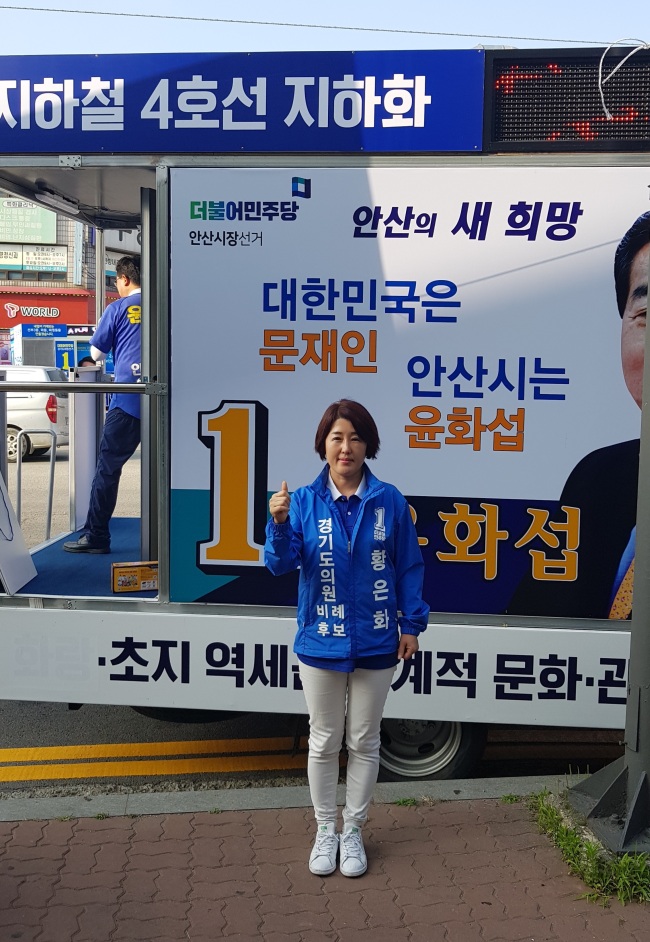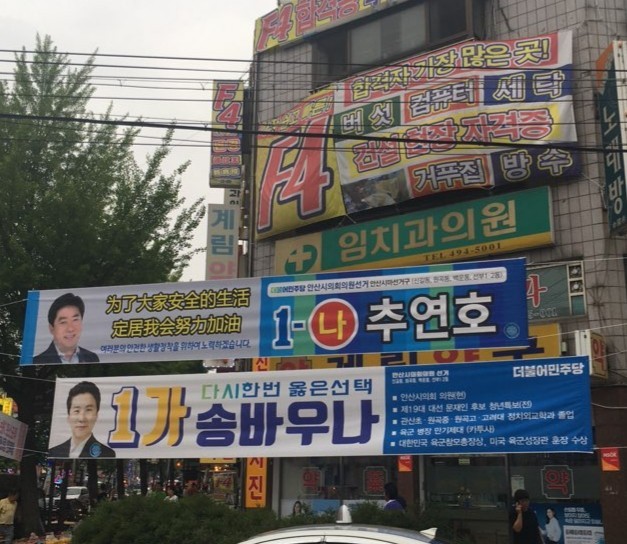Life in South Korea has never been easy for Hwang Eun-hwa, who came to the country in 1996 from China with the “Korean dream,” married a Korean man and became a naturalized citizen.
When she arrived here at the age of 26, Korean society was colder than Hwang had expected. She struggled to earn a living while experiencing discrimination against Joseon-jok, or Chinese people of Korean descent. She was born and raised in Heilongjiang province in China.
 |
(Courtesy of Hwang Eun-hwa) |
Now an owner of a cosmetics shop in Ansan, Gyeonggi Province, Hwang has taken on the challenge of a political career.
She was nominated as the ruling Democratic Party of Korea’s 13th proportional representative for the Gyeonggi Provincial Council in the upcoming local and gubernatorial elections slated for June 13.
“I want to share my experience to improve the lives of ethnic Korean-Chinese families and foreign expats in Korea,” Hwang, 46, told The Korea Herald in a phone interview on Tuesday.
She started as a restaurant waitress and worked her way up to running a supermarket for 10 years before opening her own cosmetics shop. While it is never easy to run one’s own business here, the most difficult part was the mocking looks and prejudice of the Korean people, and other business owners, because even though she is a naturalized Korean citizen, she is, after all, from China.
“Korean society often seems to put some distance between itself and the ‘multicultural’ families and foreign expats. But society should understand that they are also part of it, and that these people have put down roots here and have been living here for years and years,” Hwang said.
Struggling with her own challenges, Hwang remained largely oblivious to things happening around her. When the late liberal President Roh Moo-hyun passed away in 2009, however, her attention was drawn to politics and the society she was living in.
“I felt sad, just like other Koreans and it drew me to think about politics in Korea. I also realized I had not cared about the ethnic Korean-Chinese families and expats in Korea, who may suffer what I had experienced,” Hwang said.
She started to volunteer for Chinese elders in her region, and joined the ruling Democratic Party in April last year. She also mustered up the courage to apply to become a proportional representative member of the provincial council. As of September 2017, foreign nationals, totaling 78,606, account for some 10.7 percent of people living in Ansan.
 |
(Courtesy of Hwang Eun-hwa) |
Hwang wants to work to create multicultural household policies that have “sustained effects.” While the budget earmarked for supporting multicultural families and expats is not small, it may not go where it is needed, she pointed out.
“Often these programs are one-time events, and those who are informed about the program receive help many times while others do not,” Hwang explained. “For years I have been volunteering in community centers for the ethnic Korean-Chinese senior citizens in Ansan. “The building is shabby and these elders spend time in the basement. There is no one from our Chinese group to ask the government to improve these living conditions,” she said.
If she gets the position, she said she will also take care of the visa problems that many ethnic Korean-Chinese face here. She also wants to improve their image.
“Ethnic Korean-Chinese here also need to do something for the Korean society. I want to provide them with free lessons on Korean culture and law.”
As next Wednesday’s elections draw near, Hwang is traveling to different regions in Gyeonggi Province with her party’s election camp to encourage voting.
“I also recommended having these campaign banners in Chinese. I want more of us (Chinese and foreign expats with voting rights) to participate in the local elections, as proud members of Korean society.”
By Jo He-rim (
herim@heraldcorp.com)






![[KH Explains] For Korean automakers, Chinese EVs may loom larger than Trump’s tariffs](http://res.heraldm.com/phpwas/restmb_idxmake.php?idx=644&simg=/content/image/2024/11/14/20241114050537_0.jpg)
![[Graphic News] Tainan predicted top destination for South Koreans in 2025](http://res.heraldm.com/phpwas/restmb_idxmake.php?idx=644&simg=/content/image/2024/11/13/20241113050807_0.gif)

![[Herald Review] Cho Seung-woo takes 'Hamlet' crown](http://res.heraldm.com/phpwas/restmb_idxmake.php?idx=644&simg=/content/image/2024/11/14/20241114050593_0.jpg)